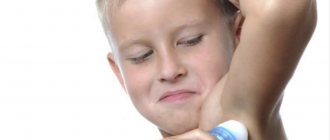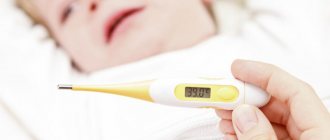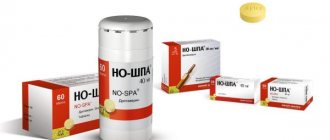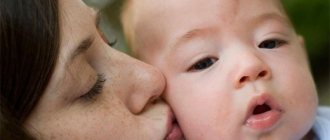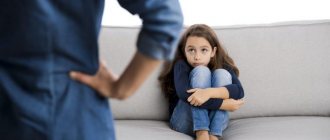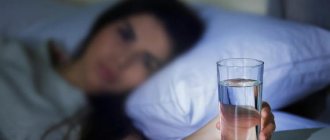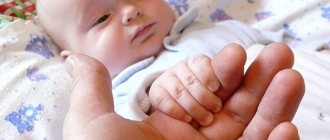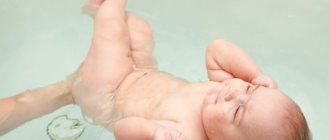What does Komarovsky think?
The famous medical specialist pediatrician expressed his opinion on the causes and methods of solving hyperhidrosis in a child. In his opinion, the main reason is the lack of comfort, the organization of which falls on the shoulders of parents. In only 3 children out of 100, the cause of increased work of the sweat glands was serious pathological disorders. If you have other symptoms besides sweating, the doctor recommends contacting a medical facility.
In the absence of clinical signs, Komarovsky advises parents to change the child’s daily routine. Excessive activity can cause sweating. Before going to bed, it is recommended to engage in calm educational games; a book is preferable to watching television.
Another common reason is a mistake when choosing bedding for a child. It should be made from natural materials without adding dyes. The less often the skin comes into contact with synthetics, the less likely it is to develop hyperhidrosis. To wash children's clothes, you need to use the appropriate powder.
The doctor advises paying attention to the filling of the blanket; if it is synthetic, you need to change it. It is not recommended to give a pillow to children under 2 years of age. Also, you should not dress your child in pajamas ahead of time; such clothing is best used only in the cold months of the year.
What to do if your baby's back is sweating
If the situation is stressful for parents and there are suspicions of illness, you should consult a doctor and undergo an examination. You need to make sure that the humidity and temperature conditions in the room where the baby sleeps meets the following standards:
- temperature 18-20 degrees;
- humidity – 40-70 percent;
- the pillow and bed linen are made from natural materials and correspond to the time of year;
- the child is covered with bedding not in excess, but in sufficient quantity for the given temperature.
Mothers often do not think about these moments and with their own care contribute to the fact that the linen on the crib becomes wet, and then run to the doctor shouting: “We are sweating a lot!” In more than 80 percent of cases of hyperhidrosis in children, there are no deviations from the norm, the child is completely healthy, and excessive sweating is caused by excessive care for the child.
You need to sound the alarm if, in addition to a wet back, other dangerous symptoms appear:
- The smell of sweat becomes sour and pungent, and the sweat itself becomes acrid. This may be a symptom of rickets or damage to the nervous system.
- Increased salinity in sweat, which appears in the form of crystals on the baby’s skin, can serve as a symptom of cystic fibrosis.
- An unpleasant “mousy” odor may indicate the development of phenylketonuria in a child.
- If the neck and head sweat along with the back, and the child becomes restless, this may indicate a cold.
If a disease is suspected and the child’s back is sweating, the pediatrician prescribes appropriate tests (primarily a biochemical blood test), based on the results of which therapy is based. If necessary, it is suggested to consult with specialists.
The treatment process is structured according to the detected disease, taking into account its specifics . If no problems are identified, general recommendations are given to the child and his parents.
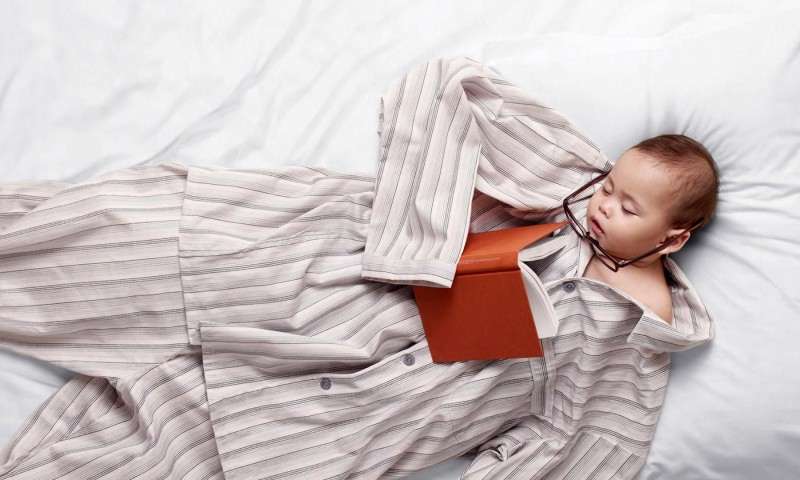
Hyperhidrosis in children: causes
It is almost impossible to list all the factors that can lead to the development of sweating in a child: increased sweating is a very common symptom. However, there are a number of the most common reasons that parents most often encounter when trying to find an effective treatment:
Rickets and vitamin D deficiency are common causes of hyperhidrosis in children under two years of age. In this case, sweating has a peculiarity: the appearance of clearly visible drops of sweat during feeding, profuse sweating at night, which is why the pillow is often wet. The child may also be bothered by itching of the scalp, which causes him to become irritable, restless, and lethargic.
- Colds and other infections
Increased body temperature, fever, profuse sweating are symptoms that accompany almost any infectious disease, including acute respiratory infections. Sore throat and flu cause only a temporary increase in the volume of sweat produced, but require immediate treatment.
Most often, this disease affects children aged three to seven years; its additional signs are irritability and enlarged lymph nodes. Treatment of lymphatic diathesis can only be prescribed by a doctor after a thorough examination of the child; Preventive measures include physical therapy, limiting the intake of sweet foods and frequent hygiene procedures.
- Cardiovascular diseases
Diseases of the heart and blood vessels rightfully occupy not the last place in this list of reasons. Malfunctions in the cardiovascular system can affect the functioning of the entire body, including the thermoregulation system and sweating. The appearance of cold, sticky sweat is one of the characteristic signs of hyperhidrosis in children caused by reasons of this kind.
Among cardiovascular diseases that lead to sweating, one can especially highlight vegetative-vascular dystonia - a common disease of not entirely clear nature, which is characterized by the phenomenon of essential hyperhidrosis, that is, increased sweating of the feet and hands. Anxiety and an unstable emotional state are often found in children with this diagnosis.
Diseases and health problems
Often the baby sweats due to unformed body systems; over time, this problem will disappear. However, some factors should certainly alert parents. Be sure to call a doctor, do not self-medicate!
Colds and fever
If a baby has a cold, then it is not surprising that he sweats in his sleep. This is due to protective processes in the body. With the help of sweat, the body cools and gets rid of harmful substances. The child may continue to sweat even after apparent recovery. In this case, there is no need to worry - this is normal.
Nervous excitement and anxiety
It is common for a baby, like an adult, to worry and worry. But the difference is that an adult’s palms sweat when they are very excited, while a baby’s head and neck sweat. To prevent your baby from sweating, you need to minimize actions that can excite his nervous system. It is also important to maintain the correct daily routine. The baby should be put to bed at the same time every day. This will protect your baby from stress and lack of sleep.
Development of rickets
If a baby sweats while sleeping, the reason may be the development of rickets.
This is a terrible disease that appears at a very early age. The first symptoms can be identified even before the disease enters the phase of active development. Rickets occurs due to problems with metabolism. Vitamin D is important for the prevention of rickets. It helps to significantly reduce the likelihood of this disease occurring. To identify rickets in the early stages, you should take a closer look at your child. The main signs of the development of the disease are:
- The baby sweats especially heavily during sleep. Most of all, the head and neck sweat.
- The baby sweats even while eating. The likelihood of constipation also increases.
- The baby's sweat becomes sticky and has an unpleasant odor. It causes itching and makes the baby scratch a lot. Because of this, bald patches may occur in the back of the head.
- The nervous system is highly excited: the baby is irritated by quiet sounds and light. In general, the condition is characterized by increased anxiety, and sleep becomes restless.
If you notice such symptoms, you should immediately contact your pediatrician. Even if there are no symptoms of the disease, it is still advisable to prevent the disease. To do this you should:
- Walk your child outside more often to produce vitamin D.
- Adhere to a proper diet.
- Do recreational gymnastics.
- Maintain a daily routine.
Nervous system problems
Also, sweat in infants during sleep may appear during the day or at night due to disruption of the nervous system. At the same time, your head, back, and limbs get wet. You should consult a doctor if you notice the following signs:
- The baby sweats even at rest, not only at night when he sleeps, and at times quite heavily.
- Individual parts of the body sweat. It can occur asymmetrically: one palm or foot.
- Sweat has a sharp, unpleasant odor.
Hereditary diseases
Sweating in infants can be hereditary. Such diseases can affect not only the sweat glands, but also other glands. It is advisable to solve this problem at an early age, because in the future the child may have problems communicating with peers.
Whatever symptoms you observe in an infant or an older child when he is sleeping or awake, do not panic. In any case, you should first consult a specialist and then take any action.
When do you need a doctor?
As a rule, the fact why an infant sweats a lot is associated with developmental disorders and the following possible diseases:
- When a newborn sweats, pathology of the autonomic nervous system is common. Additional factors for such problems: belching, nervousness, poor sleep and weight gain.
- Weather conditions, lack of sunlight and vitamin D provoke rickets. This disease is formed due to the unbalanced nutrition of the baby. In addition to hyperhidrosis in newborns, there are other symptoms of rickets: teething slows down, bone tissue in the fontanel zone softens, and the bones of the skull give in when pressed.
- Acute respiratory viral infection. A sharp increase in temperature is why the baby may sweat. A cold is indicated by lethargy and an unhealthy blush.
- An infant sweats a lot even when bathing or crying, and the skin around the nose and lips has a bluish tint, indicating cardiac dysfunction.
- Abnormalities of the thyroid gland, in addition to hyperhidrosis in infants, are responsible for trembling of the limbs and excessive excitability.
- Excess weight is sometimes to blame for the fact that the baby constantly sweats.
If a baby exhibits these symptoms, be sure to contact a pediatrician. If necessary, it is important to consult with specialized specialists:
- cardiologist;
- neurologist;
- endocrinologist
When is it a cause for concern?
Most of the time, your baby will sweat while sleeping; this is normal and nothing to worry about. But here are some reasons why excessive sweating may be a sign:
- Congenital heart problem
In addition to your baby sweating while sleeping, if you notice that she is sweating a lot during simple activities such as feeding, it may be time to make an appointment with your pediatrician as this is a symptom of a congenital heart problem.
A congenital heart problem is the result of abnormal heart development in the fetus. Children with this condition end up sweating much more than other children because their hearts have to work much harder to pump blood effectively.
- Hyperhidrosis
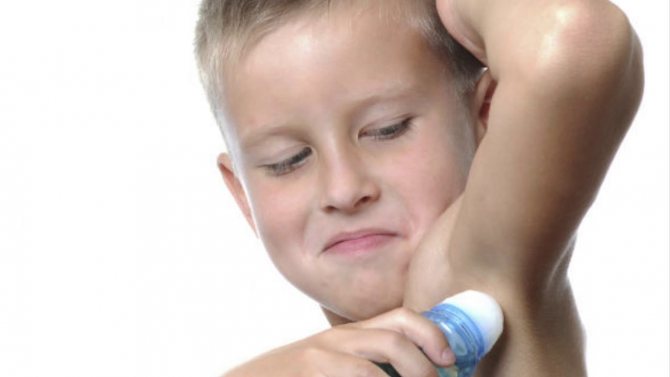
If you notice that even in a cold, air-conditioned room, your baby is still sweating a lot, this may be caused by a condition known as hyperhidrosis.
Hyperhidrosis is when a child sweats beyond what the body requires to maintain normal body temperature. People with sweaty palms and feet experience this condition.
It's not that you particularly need to medicate your child. There's nothing serious about it, despite how it sounds.
Rather, as your child gets older, you can teach him how to manage sweating, such as using antiperspirants.
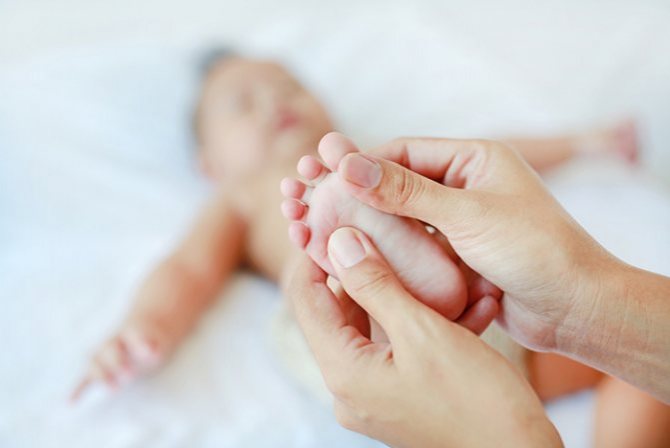
- Other reasons
While we say that baby sweating while sleeping is common and not a cause for concern if the sweating is excessive (eg, why does baby sweat a lot during feeding?), we should never ignore the issue.
It may also signal problems with the nervous system, respiratory problems, an overactive thyroid gland, or a genetic disorder.
If you are in doubt, it is best to err on the side of caution and have your child tested.
But just to reassure you moms and dads, the conditions listed are extremely rare, so please don't worry the next time you notice your baby sweating while sleeping!
When sweat is within normal limits
If an infant sweats a lot, the palms, feet and head are damp. The problem will be resolved only by changing the external environment of the child’s life. Often, the reasons why a baby sweats are obvious and do not threaten the baby’s well-being. Increased sweating is caused by the microenvironment.
Why a baby often sweats when feeding or while sleeping is explained by the following motivating cases:
- Non-compliance with temperature and humidity in the bedroom. Some parents are afraid of catching a cold in their newborn and use heaters. It is important to consider that the optimal temperature is 20–22°C, humidity – 60%.
- The texture of the bedding is synthetic: it impedes normal breathing of the skin and provokes overheating of the epidermis. Placing oilcloth or a disposable sheet to protect the mattress causes hyperhidrosis and discomfort in infants.
- When waking up, the child does not move around enough, the parents do not play or engage with him. If an infant continuously stays in the playpen and hardly moves, then he sweats very much, and bedsores may develop.
- The infant sweats profusely when taking antipyretic drugs. As a result, the temperature rapidly decreases, and perspiration appears in certain areas of the body.
- When the baby is taken out for a walk, he is wrapped up inappropriately for the season and placed in a stroller. After such a promenade, the baby sweats. In the summer heat, being in a tightly closed stroller threatens your child with heatstroke.
- It is not uncommon for a newborn to sweat while breastfeeding. This type of sweating during breastfeeding is not considered a disorder. This process takes a lot of effort and energy.
- When parents suffer from excessive sweating, a hereditary predisposition should be taken into account. This genetic trait can appear very early in a child.
- The baby sweats while teething. This difficult stage is characterized by weakened immunity.
When sweating is normal
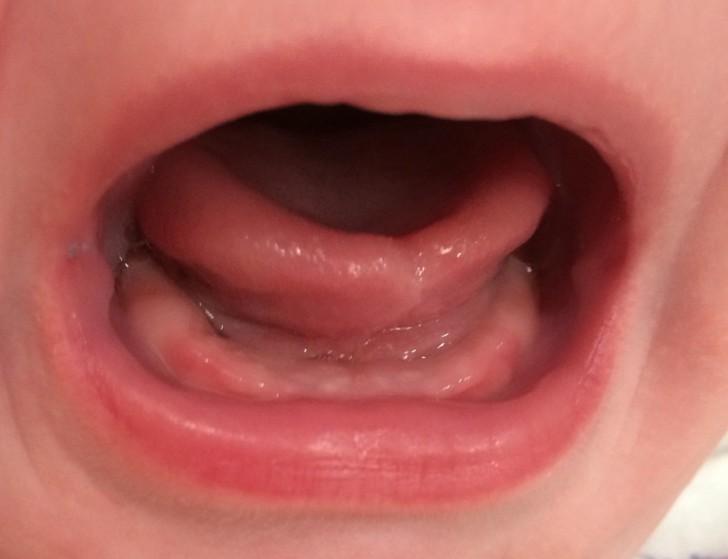
Sweating in a child increases during teething
It is normal for a child to sweat during a cold accompanied by a high fever. With recovery, the condition returns to normal.
It is also considered normal if sweating is caused by the following cases:
- Allergy. Increased sweating is a natural reaction of the body to an irritant. The main culprits are pillowcases, hats, and shampoos.
- Neurosis. Stressful situations that children face, whims, strong crying and hysterics often cause perspiration on the forehead and face. Such discharge does not indicate danger, so it should not worry parents.
Sweating also occurs in young children during teething. Painful sensations cause anxiety to the baby, and sweat production increases.
If the general condition is normal, there is no temperature, but the child is sweating, the reason may be of a domestic nature.
- Excessively wrapping the child.
- Overwork or feeling of lack of sleep.
- Excitement or frustration.
Often the cause of a wet head and perspiration is the medications given to the baby. It is worth looking at the side effects in the instructions for the drug you are taking.
Clothing and ambient temperature
If the baby is tightly wrapped in diapers or dressed in a large amount of clothing, then you may not be surprised why he is sweating. In this way, it tries to cool down, blood from the internal organs flows more to the periphery, the vessels dilate and sweat production is stimulated.
As you know from physics lessons, when water evaporates, the body on which it was cooled cools. The same thing happens in a warm external environment. If your baby's head sweats a lot, you need to review your entire wardrobe and select low-quality items.
They should be made from natural and breathable fabrics, which in turn do not irritate the skin.
It is also advisable to purchase a room thermometer that will help monitor a constant temperature that is comfortable for the child.
Another reason why a month-old baby’s head sweats may be poor-quality pillow filling. It is necessary to choose a pillow so that it holds its shape, allows air to pass through well, rustles as little as possible and is hypoallergenic. With the right pillow, dry and healthy sleep is guaranteed for your baby.
External factors
The reasons why an infant's head and body sweat during rest may be due to external aspects. Parents must create the most comfortable conditions for the baby. Sweating during sleep leads to overheating, colds, skin irritation, and rashes.
High room temperature
Parents always strive to protect their child from the cold, but this should be done in moderation. Too high an air temperature is not a favorable factor for a baby’s sleep: he becomes hot, his arms, legs, and head sweat in his sleep. Because of this, the child is capricious and fidgets at night when he sleeps. You should follow all the pediatrician's recommendations regarding room temperature and humidity. It should be 22-25 degrees, humidity not less than 70%.
Inappropriate clothing and bed
Sweating in infants during sleep, in addition to high room temperature, can be caused by improper clothing.
You should choose only good quality fabrics. In summer it is best to dress the baby in panties and a T-shirt, and in winter in a sleeping suit. Remember that all fabrics must be natural. Synthetics do not allow moisture to evaporate and can cause itching and even allergic reactions. Also, the baby gets wet and sweats in his sleep due to incorrectly selected bedding. It should be made only from natural materials. A synthetic pillow and blanket do not allow air to pass through and can cause the baby to sweat heavily during rest. There are special bedding for babies made from natural materials. They are expensive, but the child will feel comfortable and dry while sleeping.
The child sweats a lot during the day
In fact, the reasons are still the same - the clothes do not meet hygienic standards, they are not of high quality and are not adequate for the weather. For example, parents dress their infants warmly; such babies have more layers of clothing than adults in the same weather. But actively moving children need to be slowly “undressed.”
Finally, the child sweats due to excess weight. Parents see the problem, but do not always correlate other negative phenomena with it. They do not understand that a child's excessive sweating is associated with his obesity. Unfortunately, this problem cannot be called rare. Overweight children are indeed prone to increased sweating. Regular, systematic nutrition, good mobility throughout the day, and systematic physical education are important for them.
sweaty forehead
It’s true that they write in tyrnets that teething does not cause high fever. They write the norm is up to 37.5. And on Monday I called a doctor to my house (it wasn’t ours who came), she looked, listened, and said it was because of my teeth. Because of teeth 38.5 days and 39 at night! What kind of teeth are those? Like a dinosaur or what? Well, I don't believe it. I believe the Internet, where they write that the child begins to put everything in his mouth and easily catches some kind of infection, which actually causes the temperature to rise. So, today my son woke up in the morning spotted like a deer. At night the temperature was 35.5, I lay covered in cold sweat and slept poorly. In the afternoon 36.0, also sweating, cold forehead, cold feet, moody. Prostration. These red spots are on the forehead, eyebrows, along the edge of the face, on the scalp, on the neck, on the stomach and in the groin a little, most of all on the back. We have an appointment with our doctor today, but you never know what happened, maybe we shouldn’t spread it... I’m calling the clinic, thinking about calling a doctor. I describe the situation, I hear the woman on the line consulting with someone, and then saying that we can come to the doctor on duty or to our own by appointment. I think, okay, we'll come. First, Tema and I went to see the doctor on duty, he’s sitting right next to the entrance to the clinic. Again, I do this so as not to spoil my nerves. Otherwise, you never know if it’s contagious, they’ll start yelling: “Why are you here? Let others get sick?!” And I am very impressionable and with a fine mental organization. The doctor on duty cast a lazy glance at us and, without undressing our son or examining him, without asking unnecessary questions, said: “You are not contagious, go to your doctor. You either have heat rash or atopic dermatitis.” I think, phew, I’m hurt... Well, I was sweating at night, and that’s why I have prickly heat. I go up to our doctor, looks for a long time, picks, runs a fingernail over the skin, feels, feels, feels... thoughtfully says: enterovirus infection. Like, I had a fever for three days, and then everything broke out in a rash. Now you don’t need to do anything, everything will go away on its own, you’ve gotten over your illness. Yes? OK then. Well, I knew it was an infection! What can’t happen because of the teeth is such a temperature! And the doctor confirmed it. I come home, Google enterovirus and photos of skin rashes from this poop. Nothing in common at all. No resemblance. But I find roseola. Everything is like a carbon copy: three days of fever, then normalization of the temperature for 10-20 hours and after that a rash all over the body (and my son’s spots finally matched the picture on the Internet).
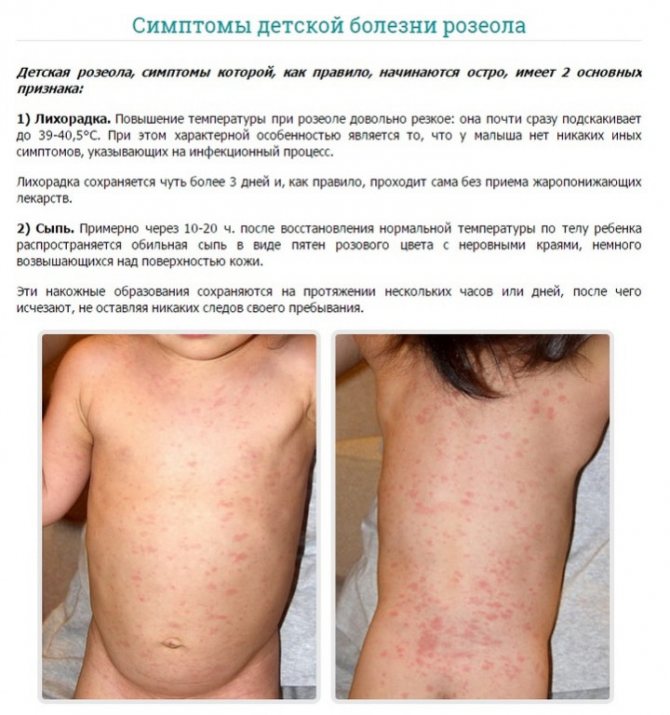
Nervous system malfunctions
The second most common alarming cause of excessive sweating is diseases of the nervous system:
- the baby sweats for no apparent reason, sometimes very much;
- only certain places or unpaired parts of the body sweat, for example, only one palm or only the forehead;
- a sweaty child smells unpleasant and pungent;
- the sweat changed its consistency: it became thick, sticky or, conversely, very liquid and abundant.
Even one such sign is enough to show the baby to a neurologist.
Dangerous symptoms
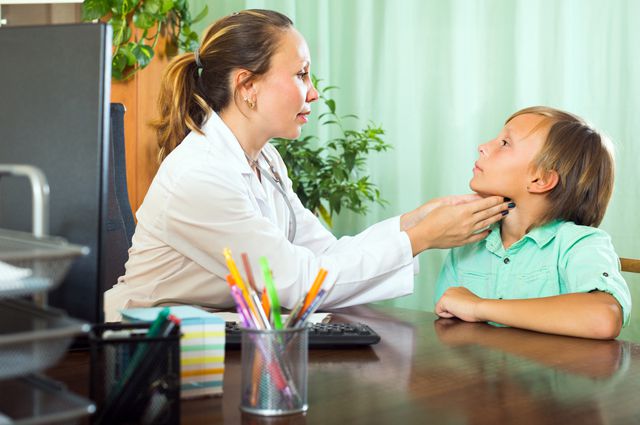
If you sweat excessively, you should check your thyroid gland
Viral infectious diseases are one of the causes of excessive sweating in young children. In this case, the child is carefully examined for the absence of other symptoms.
If drops of sweat are present exclusively on the head, and other parts of the body are dry, this may indicate the following problems:
- deficiency of vitamin D, a similar condition causes the development of rickets;
- viral infection;
- disorders in the endocrine system;
- heart pathologies.
An accurate diagnosis is made after a full examination and tests. This can only be done in a laboratory way. Based on these, the doctor draws up a treatment plan and selects appropriate therapy. Self-medication is strictly forbidden.
The reason for contacting the clinic is the child’s restless behavior and poor sleep. Such deviations indicate heart problems. It is necessary to examine the baby; the presence of a blue nasolabial triangle and painful sensations in the sternum will confirm the diagnosis.
Why does a child's head sweat?
Sometimes a child sweats a lot only in the head area. The reasons may be:
- Excessive activity of the child while awake. Sometimes infants sweat heavily in the occipital and temporal areas during the day when they cry a lot. This may mean that the baby is tired and it’s time for him to rest.
- Diseases of the cardiovascular, nervous, vegetative-vascular and endocrine systems.
- Rickets. Moreover, sweating of the head is only an indirect symptom; in case of illness, it will not be the only one.
- Bed linen, in particular, down pillow. It causes increased sweating and allergic reactions.
